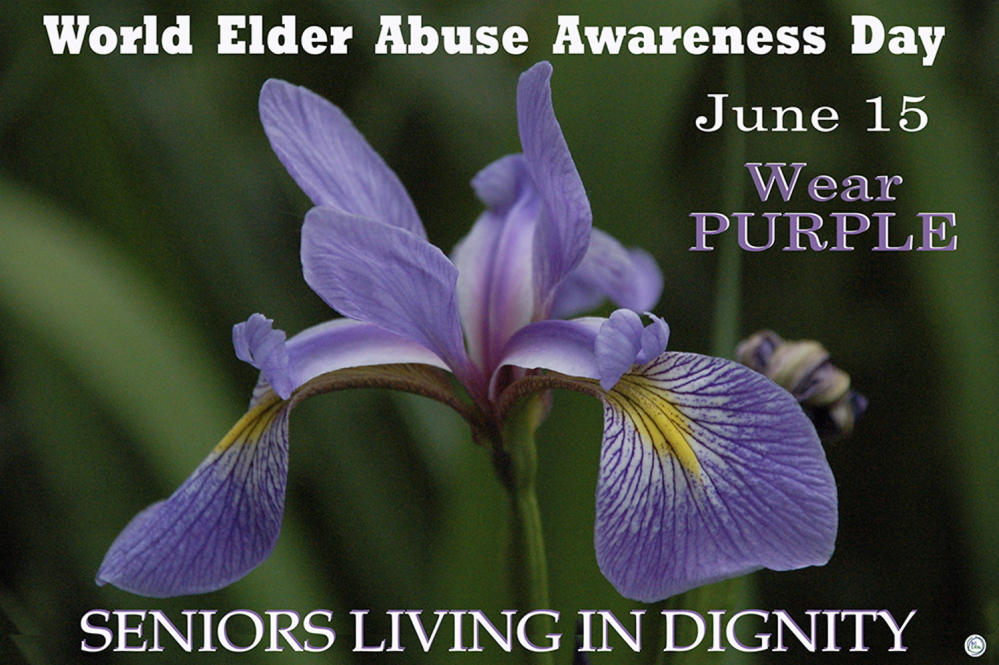I’m hiding in the bedroom. I just yelled at my husband, and I need to be alone so I don’t say anything in the heat of the moment I really don’t mean to say.
This happens to many married couples. If you just give yourself a little time to cool off, it’s back to normal. But what about those feelings you don’t want to talk about?
I am 56 years old, and my 65-year-old husband has been diagnosed with Parkinson’s. I realize that he will not be able to care for himself as the disease progresses, and I will be his caregiver. And of course, I will need to continue working full time, take care of all the household chores and support him physically and emotionally as a loving wife should. And I will need to be understanding through it all.
Now you know my secret: I worry that the stress and exhaustion might cause me to get angry enough to abuse my husband. Does that make me a bad person? A bad wife?
Today is World Elder Abuse Awareness Day.
Elder abuse can be physical, emotional or sexual. It can be in the form of financial exploitation, neglect or abandonment. And a sobering statistic is that almost 90 percent of elder abuse is perpetrated by family members, according to the National Council on Aging.
Are there others like me who read these facts and wonder, “What can I do? I don’t want to be an abuser. I don’t want to get to the point that taking care of my loved one is such a great burden that it leads me to abuse. I never imagined even thinking this way. What can be done to prevent this?”
Caregiving is often physically and emotionally stressful. In an effort to provide the best care possible, one puts their loved one’s needs before their own. In turn, feelings of sadness, anger and loneliness can develop, which could lead to caregiver depression. A caregiver can be so busy taking care of their family member and other day-to-day requirements such as work, that they do not take care of themselves. One becomes emotionally exhausted, anxious and stressed.
Of course not all family caregivers abuse their loved one. And since we are all individuals and react differently to stressful times, it is not easy to say why one family caregiver abuses, and another does not.
Caregivers, however, can get support from various programs and services that can help prevent a possible abusive situation.
The National Family Caregiver Support Program is provided by the Area Agencies on Aging in Maine (call 1-877-353-3771 to locate the one that serves your town). These agencies have dedicated staff to assist family caregivers with information and resources (learning about diseases and associated care needs and behaviors), individual counseling (in person or on the phone), support groups (an opportunity to share information, education and also realizing you are not alone), education (classes and materials to learn about diseases, associated care needs, handling behaviors and useful tips), respite and supplemental services.
Many other community programs also provide assistance and guidance for caregivers, including geriatric assessments, care management, behavior management techniques, respite services, legal and financial planning.
Formal support services include personal assistance care in the home, home-delivered meals, home modification services and adult day programs.
And programs especially for the caregiver help with health promotion, such as describing stress reduction techniques and relaxation techniques, proper diet and exercise.
The simplest step, however, is to make one phone call to your local Area Agency on Aging and let the people their provide guidance.
My last secret: I work at Spectrum Generations, which is Central Maine’s Area Agency on Aging, and I have personally seen and heard about the wonderful services those dedicated professionals provide to family caregivers. So call your local Area Agency on Aging, and let’s do our part to help decrease the occurrence of elder abuse.
Susan Garascia is a registered nurse and care and compliance manager for Spectrum Generations, Central Maine’s Area Agency on Aging, and Aging and Disability Resource Center.
 Copy the Story Link
Copy the Story Link
Send questions/comments to the editors.



Success. Please wait for the page to reload. If the page does not reload within 5 seconds, please refresh the page.
Enter your email and password to access comments.
Hi, to comment on stories you must . This profile is in addition to your subscription and website login.
Already have a commenting profile? .
Invalid username/password.
Please check your email to confirm and complete your registration.
Only subscribers are eligible to post comments. Please subscribe or login first for digital access. Here’s why.
Use the form below to reset your password. When you've submitted your account email, we will send an email with a reset code.